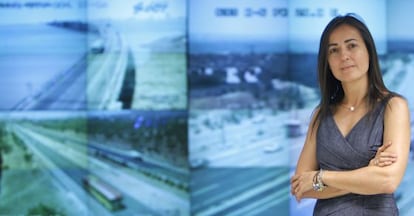"We must alter the profile: seniors and women are having more accidents"
The director general of the DGT highway safety authority María Seguí talks about her policies


María Seguí took over as head of the Directorate General of Traffic (DGT) highway safety authority five months ago, but has waited until now to talk to the media. A trained physician, and with a doctorate from Harvard in accident prevention, she gave her first interview to EL PAÍS.
Question. When you addressed Congress you mentioned a new philosophy at the DGT. Could you outline this new approach?
Answer. We have adopted a new message, from the "We can't drive for you" of before to "This is everybody's problem." The challenge here is to adopt a zero tolerance policy regarding accidents based on the fact that it is a problem we have created and that we must solve together.
Q. The idea is to refer to a more coherent idea.
A. It means that we must all work toward the same goal. All our communicative tools must be coordinated to avoid discussing a different idea each weekend.
Q. The media has been waiting to learn what the new approach was going to be.
We will announce death tolls, but with more information than up to now"
A. Well, this is the first of my interviews. Listening and talking to the different stakeholders in this issue is very rewarding but takes up a lot of time. There are only so many hours in the day. I believed that it was necessary to take the time to hear what everybody had to say.
Q. On the issue of the media and sending out the right message, you have suggested that announcing road deaths at the end of every weekend might be counterproductive.
A. I believe that simply stating numbers, without looking into what has really happened on the roads is a waste of time. You can't expect an immediate reaction on Monday morning just because there are one or two more deaths. We have to look at trends. There have been reports in the media that we are no longer going to announce the number of road deaths; this isn't the case. We are going to announce them, but with more information than has been the case until now.
Q. Does the latest count, which comes after a month, rather than 24 hours, bring into question the earlier data?
A. You have misinterpreted what I said. We are obliged by international law to report traffic deaths within 30 days of the event. Spain is one of the few countries that has not worked along these lines, and we have always had to correct our figures. What I said was that we have to abandon the system based on real-time reporting of deaths. This issue will be resolved over the term of this legislature.
Q. Your predecessor, Pere Navarro, made considerable strides in reducing the number of road deaths...
When I can choose, I prefer a toll road to a normal one; I invest in health"
A. I will do everything in my power to improve on his achievements.
Q. Are you targeting any particular groups in society to improve safety?
A. Our first campaign was anti-drugs, because this is not an area that has been intensively studied. But we have to move on from the outdated idea of a particular profile of traffic victims. More and more people over 65 are involved in traffic accidents, around 20 percent, and women make up 25 percent. We should perhaps be trying to reach these groups. Other vulnerable groups are pedestrians, people with certain disabilities, as well as children and of course motorcyclists.
Q. What new proposals will you be announcing in the coming months?
A. We will continue to work with the campaigns that are currently in place. It makes no sense to think about new ideas for the future until we have fulfilled our current obligations. For example, in the case of motorcyclists, I would mention the continued awareness campaign about helmets, because we have evidence that depending on the place and circumstances, between 13 and 30 percent of riders or passengers are not using a helmet.
Q. Do you have funds to invest in improving the conditions of roads?
A. The DGT is not responsible for road maintenance. We can only report on the scale of the problem and give advice. I would like us to be able to invest, but that remains to be seen.
Q. What is your opinion in the debate about introducing more tolls on the roads?
A. There are two sides to this issue that concern me: reducing the number of car journeys we take, and making the roads safer. Toll roads can be a mechanism, a way of making drivers think carefully about using their vehicle or taking alternative transport. We should remember that we have a road network to maintain, and one way of doing that is by generating some revenue for road use. Either way, we need to include security in the equation. When I have the choice between a normal road and a toll road, I prefer the toll road, I invest in safety. On behalf of the DGT, all I can do is to increase awareness about the impact of introducing a toll system, and to reinforce the message regarding safety, so that people can make their own decisions based on accurate information.
Q. What changes will there be to the driving test?
A. In the theory part, there will be a computer-based test, which will be more interactive, and with a greater variety of questions. The practical exam will involve independent driving. Directions will be given, and the driver will have to work out the journey alone. We hope to put this into place by 2013 or 2014 at the latest.
Q. Are you planning to allow learners to practice with another driver in the car?
A. Not in the short term, but it is something we will look into.
Q. Aside from reducing the speed limit to 90 kilometers an hour on minor roads, what other changes will there be?
A. The speed limit will be reduced in urban areas. We want to introduce the European calming model of 30 km/h in built-up and residential areas.
Q. What about increasing the maximum speed limit to 130 by year's end?
A. If this were to take place, it would only be on certain roads and in certain sections where there are no accidents. We would be talking not just about increasing the speed limit only when the weather permitted, but if we can further reduce road deaths and if the economic situation picks up.
Q. Does higher speed automatically mean increasing the danger of accidents?
A. In general, that is true. But we have to look at specifics. Which stretches of road would we be talking about? How many vehicles use that stretch of road? I don't think that it helps to discuss this issue in terms of generalities. But for more than 300,000 kilometers of Spain's roads, we would likely see a reduction in the speed limit.
Q. Will there be any initiatives regarding bicycles?
A. It is very likely that we will introduce legislation to prevent bicycles from using the sidewalk, except under certain conditions.
Q. You have talked about cracking down on foreign drivers who break the law...
A. There are several provinces where around half speed-limit violations are committed by non-Spanish vehicles, and nothing is done about them. There is a European directive that comes into effect in 2015 that details international cooperation about this. But Spain cannot wait, and we are moving forward on our own. The first step is through bilateral agreements. We already have one with France, and one is being outlined with Portugal. The second line of attack is to work with private companies to track down offenders and make them pay their fines.
Q. Can you tell us about the DGT's new research unit?
A. Our job is not to carry out research, but the DGT needs answers to many questions if it is to play a proper role in policy and strategy. Regarding the speed limit issue, if you were to ask me how many kilometers are driven on our roads, I wouldn't be able to tell you. There used to be funds for research, but the problem was that it basically worked along the lines of: "I've come to offer you a project on this area; you tell me if you have the funds to finance it, and if you will." But we are now taking the initiative ourselves and asking for information. We have organized a conference with some 360 researchers to inform them about our priorities.
Q. What are your priorities?
A. We have a great many. For example, studies to look at how drugs affect people's driving. Our research is now much better coordinated.
Q. Any changes in policy regarding the victims of traffic accidents?
A. Until now, the DGT's job was to gather information at the scene of an accident. We are not tasked with helping the victims of accidents, but we do want to do more, for example by following up the recovery of accident victims, and to work with them in raising awareness about road safety.
Tu suscripción se está usando en otro dispositivo
¿Quieres añadir otro usuario a tu suscripción?
Si continúas leyendo en este dispositivo, no se podrá leer en el otro.
FlechaTu suscripción se está usando en otro dispositivo y solo puedes acceder a EL PAÍS desde un dispositivo a la vez.
Si quieres compartir tu cuenta, cambia tu suscripción a la modalidad Premium, así podrás añadir otro usuario. Cada uno accederá con su propia cuenta de email, lo que os permitirá personalizar vuestra experiencia en EL PAÍS.
¿Tienes una suscripción de empresa? Accede aquí para contratar más cuentas.
En el caso de no saber quién está usando tu cuenta, te recomendamos cambiar tu contraseña aquí.
Si decides continuar compartiendo tu cuenta, este mensaje se mostrará en tu dispositivo y en el de la otra persona que está usando tu cuenta de forma indefinida, afectando a tu experiencia de lectura. Puedes consultar aquí los términos y condiciones de la suscripción digital.








































